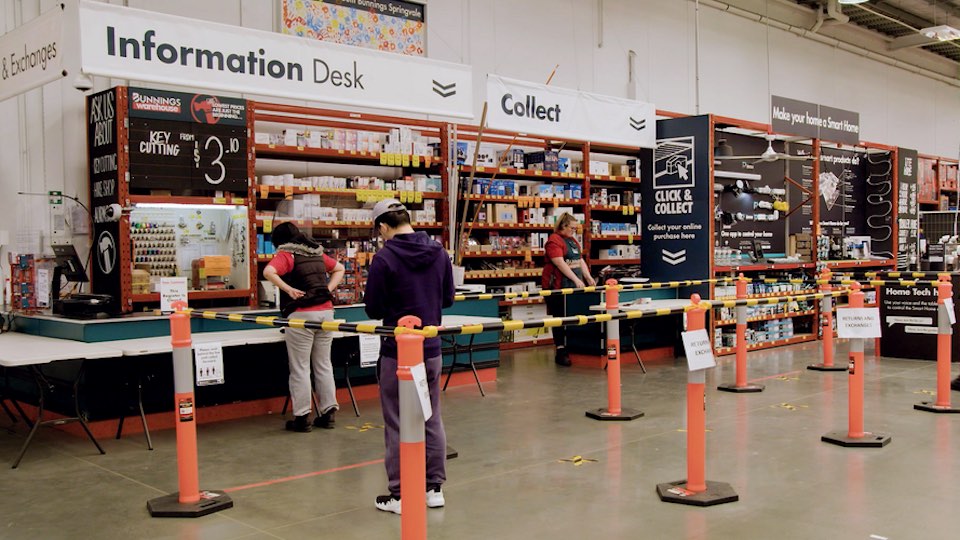Australian stores stop use of facial recognition

Three major Australian retailers have stopped using facial recognition technology in their stores for the time being. The consumer protection organization CHOICE had previously criticized the surveillance measures. In the meantime, the Office of the Australian Information Commissioner is also investigating whether the stores’ actions are compatible with data protection law in Australia.
Consumer advocates had reported in June that home improvement retailer Bunnings, department store chain Kmart and electronics retailer The Good Guys were using the controversial surveillance technology in their stores. As the Guardian reported Monday, Bunnings and Kmart have now turned off the technology for the time being. However, a Kmart spokesperson stressed that the company believes the use of the technology is appropriate.
Back in late June, The Good Guys had said it would suspend facial recognition for the duration of an investigation by the Office of the Australian Information Commissioner.
Following a complaint by consumer advocates, the authority is currently investigating whether there has been a breach of the Australian Privacy Act. Australia’s Information Commissioner and Privacy Commissioner Angelene Falk explained that sensitive biometric data may only be collected if it is necessary and if those affected consent.
Hidden indications of facial recognition
In June, the Australian consumer protection organization CHOICE criticized the fact that most customers are probably not aware that they are being monitored in stores with facial recognition. References to the practice can be found online in the chains’ privacy policies. Kate Bower of CHOICE had noted, “However, since these are retail stores, no one is likely to read the privacy policies before entering a store.”
Admittedly, facial recognition notices also hung at the entrances of Kmart and Bunings stores. However, consumer advocates criticized the signs for being small and inconspicuous and easily overlooked.
Facial recognition systems process biometric data that cannot be altered and allow people to be identified for life. CHOICE criticizes the use of this technology in stores as disproportionate because an excessive amount of data would be collected. In addition, online privacy policies and unobtrusive signage were not enough to adequately inform customers about the use of the technology.
Edward Santow, a professor at the University of Technology Sydney and Australia’s human rights commissioner until 2021, had warned in June that the technology was leading “into the realm of mass surveillance.”
Stores argue it prevents theft
Retailers argue that facial recognition contributes to store security and is a preventative measure against theft. Australia’s privacy watchdog, Falk, said both are important goals, yet the use of facial recognition poses significant privacy risks. Companies would need to be able to demonstrate that it is proportionate to capture the faces of all customers for this purpose.
CHOICE welcomed the fact that retailers are now halting the use of facial recognition for the time being – but also called for them to abandon it permanently. The organization’s Kate Bower told the Guardian she expected a “landmark decision” from the privacy regulator “that will set the tone for the use of the controversial facial recognition technology in Australia.”
Another store chain already had to disable facial recognition
Following the complaint by CHOICE, the privacy regulator had asked retailers to “carefully” review a previous decision: General merchandise chain 7-Eleven had installed customer survey tablets in 700 of its Australian stores since June 2020. The cameras installed in them had photographed customers filling out the surveys. The images were then converted into biometric facial prints and the person’s gender and approximate age were determined. They were also matched against all images taken in the previous 24 hours. If there was a match, they were flagged for verification. Within ten months, up to 3.2 million facial images are said to have been collected in this way.
The Office of the Australian Information Commissioner had ruled in October 2021 that the biometric data had been collected without the consent of those concerned and was not necessary for the customer surveys. In this case, too, signs at the stores and privacy notices available online had pointed out the facial recognition. However, the data protection authority did not consider this sufficient. 7-Eleven had already deactivated facial recognition before the decision. The company was also ordered to delete the stored data.
There is also a similar case in the UK at the moment: The civil rights organization Big Brother Watch filed a complaint with the British data protection authority on Tuesday against the Southern Co-operative grocery chain. It says it uses facial recognition in 35 of its stores to identify people who have previously been banned from stores, for example. Big Brother Watch criticizes that this is “most likely unlawful” and must be “stopped immediately.” (js)